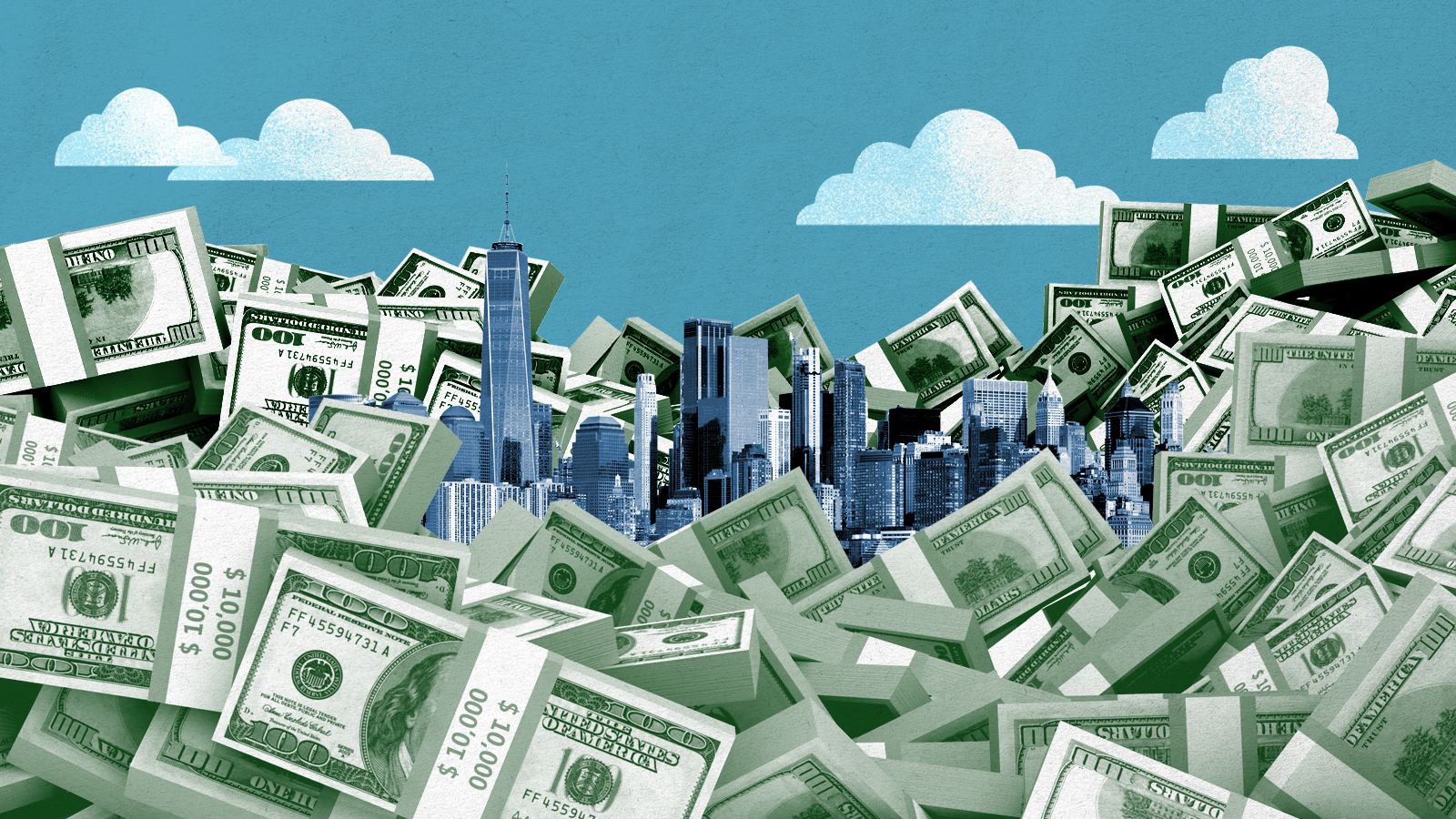The 10 most expensive cities in America
These metropolitan areas are the priciest in the country


A free daily email with the biggest news stories of the day – and the best features from TheWeek.com
You are now subscribed
Your newsletter sign-up was successful

When it comes to cost of living, neither the East Coast nor the West Coast fare all that well. Perhaps it's no surprise, but if your top priority when choosing a home is affordability, cities in coastal states generally aren't the way to go — though these locations can have a lot to offer in a number of other categories.
Here's a rundown of the cities that rank as the most expensive in the U.S. This list is based on Kiplinger's analysis of data from the Council for Community and Economic Research, which offers a Cost of Living Index measuring prices across 262 urban areas. Data was collected during the first quarter of 2022.
10. Oakland, California
Oakland might be less expensive than its neighbors in the San Francisco Bay, but it still has a cost of living 49 percent above the U.S. average. Kiplinger notes that while "median household income in Oakland is about 23 percent higher than the national level, median home values are more than three times the U.S. as a whole." Transportation costs also come in at a jaw-dropping 40 percent higher than the national average, while groceries, health care, and utilities are 30 percent higher.
The Week
Escape your echo chamber. Get the facts behind the news, plus analysis from multiple perspectives.

Sign up for The Week's Free Newsletters
From our morning news briefing to a weekly Good News Newsletter, get the best of The Week delivered directly to your inbox.
From our morning news briefing to a weekly Good News Newsletter, get the best of The Week delivered directly to your inbox.
9. Seattle, Washington
Living in Seattle, which Investopedia dubs "the most popular city in the country's Pacific northwest," doesn't come cheap. The cost of living in Seattle is 50.7 percent above the U.S. average, and that's driven largely by housing costs. But transportation, health care, groceries, and miscellaneous goods and services (think your haircut or a ticket to the movie theater) are also pricey. In good news, Kiplinger reports that Washington State is among the most tax-friendly states for middle-class families.
8. Boston, Massachusetts
U.S. News & World Report describes Boston as "a small town with all the perks of city life," but it certainly rates among the big cities when it comes to cost of living. Although admittedly not as high as some other East Coast locations, Boston has a cost of living 50.8 percent higher than the U.S. average.
Kiplinger succinctly calls housing-related costs in Boston "a killer," with both renters and homeowners paying over three times the national average. Other categories might not run quite so high, perhaps thanks to the concentration of students living in Boston.
7. Los Angeles, California
Los Angeles ranks No. 7, with its cost of living 51.9 percent above the national average. To add insult to injury, Kiplinger reports that "median annual incomes are a paltry $296 above the national average." Transportation costs are also high in L.A. — 26 percent above the national average — and housing runs a whopping 134 percent above the U.S. average.
A free daily email with the biggest news stories of the day – and the best features from TheWeek.com
6. Orange County, California
This county, which includes Anaheim, Santa Ana, Irvine, and Newport Beach, has an average home price of $1.1 million, which is the fifth-highest in the U.S. However, in other areas, costs aren't quite so bad. Apartment rent is still twice the national average, but utilities are cheaper than average and health-care costs are only just above average.
5. Washington, D.C.
The nation's capital is also one of its most expensive cities. But, according to Kiplinger, it's more complicated than high costs across the board: "Housing-related expenses, including rents and mortgages, are by far the most burdensome at 2.6 times the national average, [...] but other expenses aren't too bad." Health-care costs in D.C. are actually below the U.S. average, and so are those for groceries, utilities, and transportation.
When you apply via links on our site, we may earn an affiliate commission
4. Brooklyn, New York
According to Kiplinger, "if Brooklyn were an independent city, its population would be on par with Chicago, the third-largest city in the nation," which might help explain why its costs are so high Brooklyn's cost of living is 74.9 percent above U.S. average. It's fourth-place ranking is likely thanks to the fact that while prices are high, the costs of utilities, groceries, and health care aren't as far above the national average as in some other locations.
3. San Francisco, California
San Francisco has seen a lot of growth due to the influx of money from the tech industry. The cost of living in San Francisco is 84.2 percent above the national average. Home prices average $1.4 million, while monthly rent is around $3,700. These above-average costs spill over into groceries, utilities, health care, and transportation. In fact, according to Investopedia, a "family of four with both adults working would need $128,878 in household income after taxes just to make ends meet."
2. Honolulu, Hawaii
As Investopedia puts it, "[r]esidents here pay a lot of money for just about everything." Groceries cost 153 percent more than the national average and utilities run 102.2 percent more. This astronomical markup is largely due to the fact that what's sold in Hawaii has to arrive by boat or by plane. But things don't look much rosier in the housing category — the cost of housing in Honolulu is more than four times the national average.
1. New York, New York
The cost of living in the New York City borough of Manhattan is a whopping 137.8 percent above U.S. average. Typical rent averages $4,604, while the average home price is an astronomical $2.4 million. Residents also pay top dollar for groceries and transportation. But on the upside, you surely won't have a shortage of options when it comes to entertainment, eating, or shopping — if you have anything left in your wallet.
Becca Stanek has worked as an editor and writer in the personal finance space since 2017. She has previously served as the managing editor for investing and savings content at LendingTree, an editor at SmartAsset and a staff writer for The Week. This article is in part based on information first published on The Week's sister site, Kiplinger.com
Becca Stanek has worked as an editor and writer in the personal finance space since 2017. She previously served as a deputy editor and later a managing editor overseeing investing and savings content at LendingTree and as an editor at the financial startup SmartAsset, where she focused on retirement- and financial-adviser-related content. Before that, Becca was a staff writer at The Week, primarily contributing to Speed Reads.
-
 The environmental cost of GLP-1s
The environmental cost of GLP-1sThe explainer Producing the drugs is a dirty process
-
 Greenland’s capital becomes ground zero for the country’s diplomatic straits
Greenland’s capital becomes ground zero for the country’s diplomatic straitsIN THE SPOTLIGHT A flurry of new consular activity in Nuuk shows how important Greenland has become to Europeans’ anxiety about American imperialism
-
 ‘This is something that happens all too often’
‘This is something that happens all too often’Instant Opinion Opinion, comment and editorials of the day
-
 How your household budget could look in 2026
How your household budget could look in 2026The Explainer The government is trying to balance the nation’s books but energy bills and the cost of food could impact your finances
-
 What is a bubble? Understanding the financial term.
What is a bubble? Understanding the financial term.the explainer An AI bubble burst could be looming
-
 The FIRE movement catches on as people want to retire early
The FIRE movement catches on as people want to retire earlyIn the spotlight Many are taking steps to leave the workforce sooner than usual
-
 Who wants to be a millionaire? The dark side of lottery wins
Who wants to be a millionaire? The dark side of lottery winsIn The Spotlight Is hitting the jackpot a dream come true or actually a nightmare?
-
 How can you find a financial adviser you trust?
How can you find a financial adviser you trust?the explainer Four ways to detect professionals who will act in your best interest
-
 With economic uncertainty, 2025 looks to be a 'No Buy' year
With economic uncertainty, 2025 looks to be a 'No Buy' yearIn the spotlight Consumers are cutting back on splurges to combat overconsumption
-
 Is it worth renovating before listing your home?
Is it worth renovating before listing your home?The explainer Getting your house in top-notch shape will help attract potential buyers, but not all renovations are worth the money
-
 Hoping to sell your house in 2025? Here's what to expect.
Hoping to sell your house in 2025? Here's what to expect.The Explainer Will the housing market favor buyers or sellers this year?
